#でお茶するのが
Explore tagged Tumblr posts
Text
instagram
#IFTTT#Instagram おはようございます! 今週は今日明日10-17時openです! 今日は【米粉の栗緑茶マフィン】をご紹介🌰 秋めいてきて、ほっこり風味のおやつが恋しくなるのは皆同じですよね?#Instagram
0 notes
Text
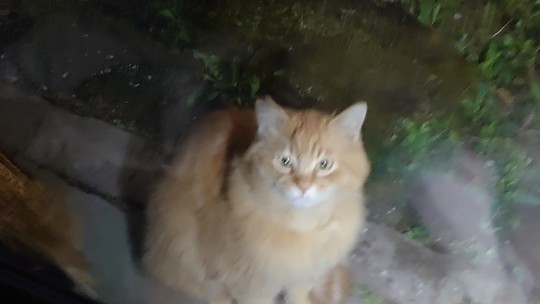
ふわふわちゃとら、あるいはナサケナイかおのちゃとら
2021年の春に突如現れたふわふわした茶トラ。
よく喋り、どちらかというと猫より家主に用があったようであった。
恐ら���Jさんの腹違いの兄弟の血族と推測される。
保護を検討した矢先現れなくなったが家主の心に2匹目の猫…という気持ちを持たせてしまい、結果こふくを迎えるきっかけとなった重要な猫でもある。
後日分かったところでは、現れなくなった直後に隣町の猫ボラさんのところに身を寄せたものの、感染症か何かですっかり毛が抜けてしまい、一時期は全くふわふわではなかったらしい。
The Fluffy Orange, or the miserable face orange cat
He is a cat appeared suddenly on the early spring in 2021. He spoke so much and we thought he came to meet with landlady rather than Mr.J. But he must be a blood relative of Mr.J's half brothers or sisters.
He is rhe important cat that made landlady decide to adopt the second cat and caused to take Kofuku, although he stopped to come our garden suddenly again .
He adopted by the cat volunteers in the neighbouring town afterwards but he lost his fluffy furs because of infectious disease or something for a period of time.
1K notes
·
View notes
Text

今回、たくさんの方に応援していただく中で、私たちも、好きなものや共感できるものを、誰かと共有してみたいなと思うようになりました。
straycatjのアカウントは我が家のねこさまが主役ですので、猫、猫アート、あとは頑張っても食用のお魚が限界でしょうか。
なので、それ以外にも目に留まった、きれいなもの、かわいいもの、優しいものなんかを、残していける場所を作りたくなりました。
ゆるゆる行きますが、よろしければ遊びにいらしてください。
なおナビゲーターは、茶志朗丸が務めます。
With the support and kindness of many people, we've come to feel that we'd like to share the things we love and find beautiful with others too.
Since the main StraycatJ account belongs to our royal feline, we try to keep things mostly cat-related—art, and maybe edible fish at most.
So we decided to make a little space for lovely, gentle, and beautiful things outside of that.
It’ll be a slow and quiet place, but we hope you’ll stop by.
Navigator: Chashiro-Maru
815 notes
·
View notes
Text

メイドミクさん🍎 お庭に大きなリンゴの木があるお屋敷で働いています! ✽ 得意料理はお庭で収穫したリンゴを使ったアップルパイ🥧 好きな紅茶フレーバーはアップル☕ ✽ ……というイメージでデザインしてみました!
イラコン参加用に描いたオリジナルデザインのメイドミクさんです🍎 まだ結果は出て無いのですがWEBサイトでの公開はOKらしいので一足お先にお披露目!
213 notes
·
View notes
Text

スポメン復帰第三弾!第二段はまた今度。
ケツマンコが疼いてたまらんという事で、開店と同時にスポメンに。
タチの人が少なくて出遅れてしまい、フラフラしてたら、3階奥で待機してたマッチョに誘われて久しぶりのタチをしてしまう。騎乗位で掘ってたらすぐ横にチンポ差し出されて喉奥までしゃぶりながらマッチョさんの締まりのいいケツを楽しむ。
その後にいつものガッチビさんに掘られて、変態スイッチが入ったところで、すかさずガチマラ兄貴に更に掘られる。
その次にこれまたいつも相手してくれるデカマラ坊主兄貴に乳首摘まれて、跪いてケツ突き出しながら、デカマラしゃぶる。頭掴まれてえづきながらデカマラをひたすら喉尺してると、ケツにローションが。
頭掴まれてるから振り返る事もできず、誰のか分かんないナマチンポをケツに入れられる。口マンコもケツマンコもデカマラ激しく抜き差しされて、変態乳首捻り上げられて、完全にオモチャ状態。ドMな俺にはたまんないシチュエーション笑笑。やっと選手交代で坊主兄貴のデカマラがケツマンコに。ガタイデカいし思いっきり腰振ってくるから、吹っ飛ばされそうになりながら、必死にデカマラをケツで受け止める。パンパン音立てて掘られてたから、色んな人に見られて口にチンポ差し出されて咥えてた。
やっとひと段落してさすがに疲れたので、休憩しながらフラフラしてたら、メガネ兄貴に誘われてナマチンポぶち込まれる。ガンガン掘られてたら、横から手が伸びてきて乳首責められる。さっきの坊主兄貴の乳首責めでかなり肥大してたらしく、デカ乳首たまんねーと言われながら責められ続けてると、メガネ兄貴がイキそうになって1発目を注がれる。その後に乳首責めてた人にケツ掘られて、一旦休憩。
その後に���めちゃくちゃガタイのデカい兄貴に誘われてチンポ握ると極太でケツに欲しくなって騎乗位で跨る。極太マラが気持ち良すぎて夢中で自分で腰振ってケツイキ状態に。正常位で覆い被られて兄貴の体重を感じながら掘られてたら、イキそう、中出しするぞ!と言われ、大量のザーメンが中に注がれて終了。
大量すぎて種漏らしそうになるのを我慢しながらまたフラフラ。めちゃくちゃイケメンのスジ筋体型だけどしっかり筋肉ついてる兄貴に誘われる。めちゃくちゃタイプの兄貴で乳首責めながらチンポ咥え込んでると気持ちいいと感じてくれて、俺のテンションも上がりまくり。
俺の肥大乳首を思いっきり捻り上げられて、痛気持ちよくて頭真っ白に。めちゃくちゃ形のいいチンポに跨って、お互いの乳首責め合ってやりまくる。その後にイチャイチャモードになってベロチューと乳首責め合いをずっとして、相手の体温感じながら抱きしめあう。なんか別れるのが寂しかったけど一旦休憩。
その後、ちょっと時間があいて、カッコいいガテン風の兄貴がいたのでダメ元でチンポ触るとOKだったみたいでやる事に。
雰囲気もワイルドだし、筋肉ゴツくて腕も胸筋もガチガチだし背中も広いし、マジで憧れてしまう。この人とやれると思うとテンションMaxに。正常位で掘られてると、口から唾落とされて舌出して受け止めて唾液交換する。ベロチューもめちゃくちゃ上手くてガンガン掘られながら、唾まみれになってベロチューしまくる。次にバックになって掘られるけど、筋肉すごいから高速ピストンでガンガン掘られる。ケツ気持ち良すぎてずっと掘られてたかったけど、種が上がってきたらしく、中に出すぞと言われて種付けされる。また大量に出されてケツマンコが種で満タンに。
名残惜しいけど、筋肉兄貴と別れて、またフラフラしてると、爽やか茶髪青年がいたので、またダメ元でケツ触るとOKしてくれた。
デカマラで長さもあったけど、めちゃくちゃ固くてカチカチ。乳首も感じるらしく、乳首責めながらまずは口マンコでデカマラ味わう。それから、ケツマンコにデカマラ入れてもらうけど、カチカチで圧迫感がすごくて、俺のケツマンコの中でひくついてるのが分かるくらい笑笑。正常位でガンガン掘られてたらイキそうになったらしく、腰振り止まったので俺が自分から腰振ってデカマラの先から根元に向けてピストンする。デカくて硬いからケツマンコにいい感じて突き刺さってまたケツイキ。最後の正常位でガンガン掘ってイキそうになったらしく、ヤバっと言われてチンポ抜かれて結局種はもらえず…。
予定があったのでこれで帰らなきゃいけなかかったけど、もっと掘られて種壺になりたかった笑笑。
また近々行くので、見かけたらケツマンコにチンポぶち込んでくださいー。
207 notes
·
View notes
Text
天安門事件のとき、中国に帰国できない日本在住の中国人留学生の支援を少しだけしたことがある。新宿のある喫茶店で留学生たちの要望を聞き、彼らから当時は高価だったパソコンの提供などを求められた。私は知り合いの経済人に相談して、それなりの対応をしたが、それは戦前の玄洋社と孫文の関係が念頭にあったからだ。
だが、現実は厳しかった。彼らは民主化を叫びながらも、チベットなどは引き続き支配下に置き、台湾の「独立」を認めるつもりなどなかったのだ。それどころか、日本は奈良時代から中華文明の恩恵にあずかっているので、日本が中国の民主化を支援するのは当然だ、という態度だったのだ。
一方、この天安門事件のあと、天皇陛下の訪中があり、それにあわせて中国を訪問。北京大学では、日本語ができる中国人学生たちと話をした。その際、彼らは雑誌『エコノミスト』を始めとする英語の経済、金融、政治についての論考を懸命に読み、中国の経済的発展を自らで担おうとしていた。そのために、日本の戦後の経済発展についても謙虚に学ぼうとしていたのが本当に印象的だった。
私が話した中国人のエリートたちは自国の国益と自己の栄達を中心に考えていて、「世界平和」とか��日中友好」などは二の次だということを、いまさらながらに思い知った。
私が知っている中国人たちはごく僅かであり、一般論にしてはいけないと思うが、中国「民主化」運動に過大な期待を抱いてはいけないと、この日を迎えるたびに自戒している。

120 notes
·
View notes
Text
MHA Chapter 431 Part 2 spoilers translations
Rough/literal translations for the second part of the bonus chapter are under the cut.

1 お茶子ちゃんじゃあねまた明日 おちゃこちゃんじゃあねまたあした Ochako-chan jaa ne mata ashita "See you tomorrow, Ochako-chan!"
2 うん!おやすみー un! oyasumii "Yeah! Good night."
3-4 明日からまた頑張ろう あしたからまたばんがろう ashita kara mata ganbarou Let's do our best again tomorrow.
5 席離れててちゃんと話せんかったな せきはなれててちゃんとはなせんかったな seki hanaretete chanto hanasenkatta na Our seats were far away so we couldn't properly speak.
6 まァでも別に まァでもべつに maA demo betsu ni Well, it doesn't matter,
7 仕事でもよく会うし しごとでもよくあうし shigoto demo yoku au shi since we meet often at work.
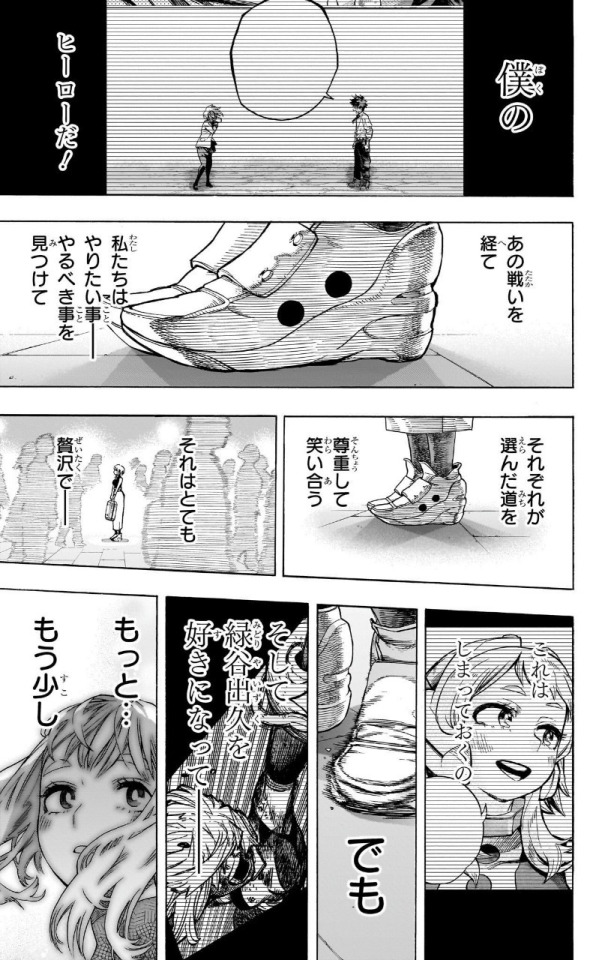
1-2 僕のヒーローだ! ぼくのヒーローだ! boku no HIIROO da! You're my hero!
3 あの戦いを経て あのたたかいをへて ano tatakai wo hete After that battle,
4 私たちはやりたい事ーーやるべき事を見つけて わたしたちはやりたいことーーやるべきことをみつけて watashi-tachi wa yaritai koto--yaru beki koto wo mitsukete we found the things we wanted to do--the things we should do. (Note: She's clarifying that these things they wanted to do they found were things they felt they should do or that they needed to do.)
5 それぞれが選んだ道を それぞれがえらんだみちを sorezore ga eranda michi wo We each had our chosen paths
6 ��重して笑い合う そんちょうしてわらいあう sonchou shite warai au that we both respected, and we laughed together.
7-8 それはとても贅沢でーー それはとてもぜいたくでーー sore wa totemo zeitaku de-- That was more than enough-- (Note: Literally, she thinks "That's very luxurious--".)
9-10 これはしまっておくの kore wa shimatte oku no I'll put this [feeling] away.
11 でも demo But
12 そして緑谷出久を好きになってーーー そしてみどりやいずくをすきになってーーー soshite Midoriya Izuku wo suki ni natte--- And then I came to like Izuku Midoriya---
13 もっと… motto... more...
14 もう少し もうすこし mou sukoshi just a little
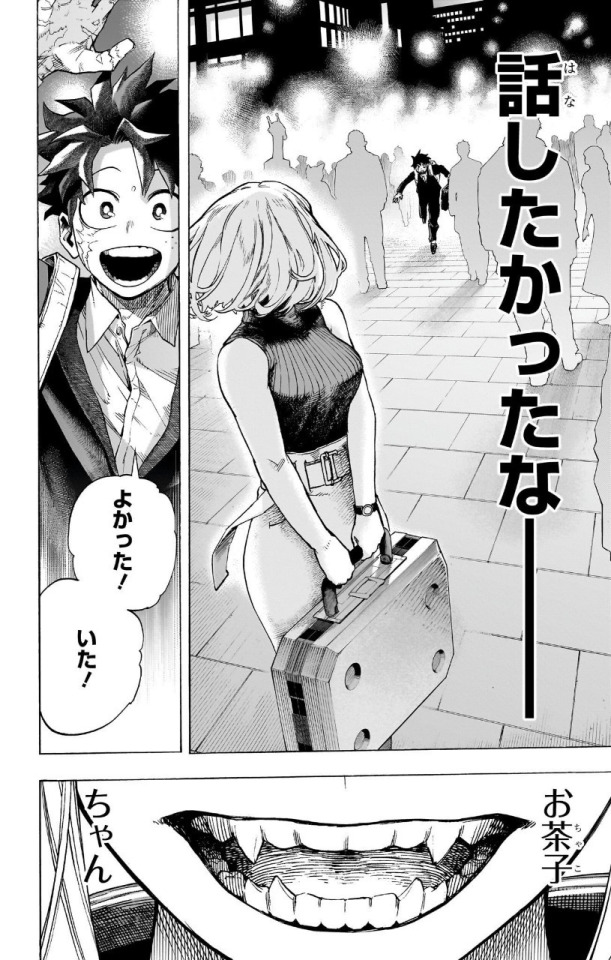
1 話したかったなーー はなしたかったなーー hanashitakatta na-- I wanted to talk--
2 よかった! yokatta! "Thank goodness!"
3 いた! ita! "You're here!"
4-5 お茶子ちゃん おちゃこちゃん Ochako-chan Ochako-chan

1 いいんだよ iinda yo It's okay.
2 あのっ ano "Uh,"
3 僕は ぼくは boku wa "I"
4 皆尊敬してて みんなそんけいしてて minna sonkei shitete "respect everyone"
5 皆特別で みんなとくべつで minna tokubetsu de "everyone is special [to me]"
6 好きなんだって すきなんだって suki nanda tte "and I love them."
7 ずっとそういうものだって思ってた ずっとそういうものだっておもってた zutto sou iu mono datte omotteta "I was always thinking something like that."
8 んだけど…! ndakedo...! "But...!"
9 今日…なんか きょう…なんか kyou...nanka "today...I"

1-2 麗日さんともっと話したいって思った うららかさんともっとはなしたいっておもった Uraraka-san to motto hanashitai tte omotta "thought I want to talk more with Uraraka-san."
3 これからも kore kara mo "From now on,"
4 もっとーー motto-- "more--"
5 私は好きに生きたから わたしはすきにいきたから watashi wa suki ni ikita kara "Because I lived how I liked,"
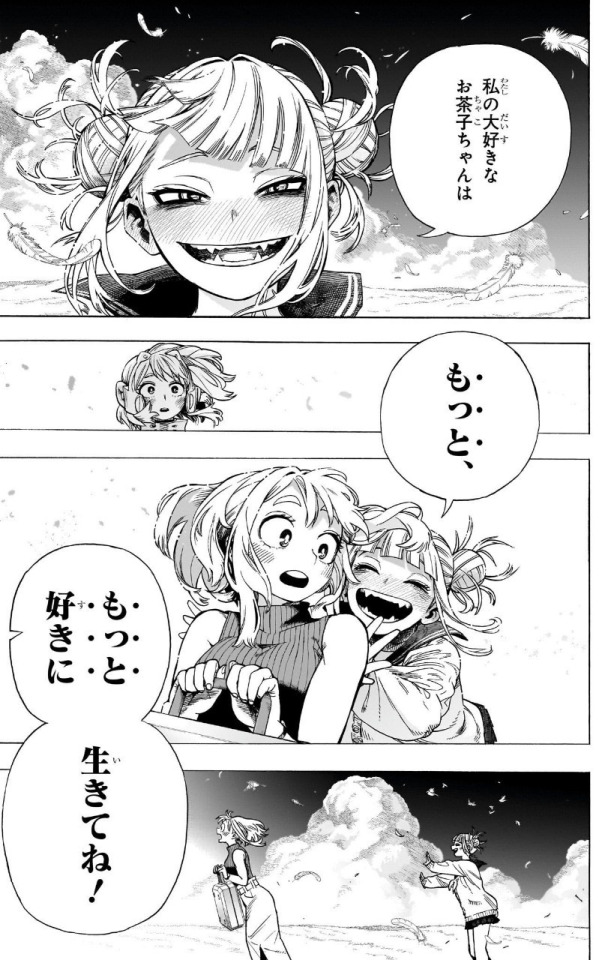
1 私の大好きなお茶子ちゃんは わたしのだいすきなおちゃこちゃんは watashi no daisuki na Ochako-chan wa "Ochako-chan, who I loved," (Note: You could also read this as "my beloved Ochako-chan".)
2 もっと motto "more,"
3-4 もっと好きに生きてね! もっとすきにいきてね! motto suki ni ikite ne! "live more how you like!"
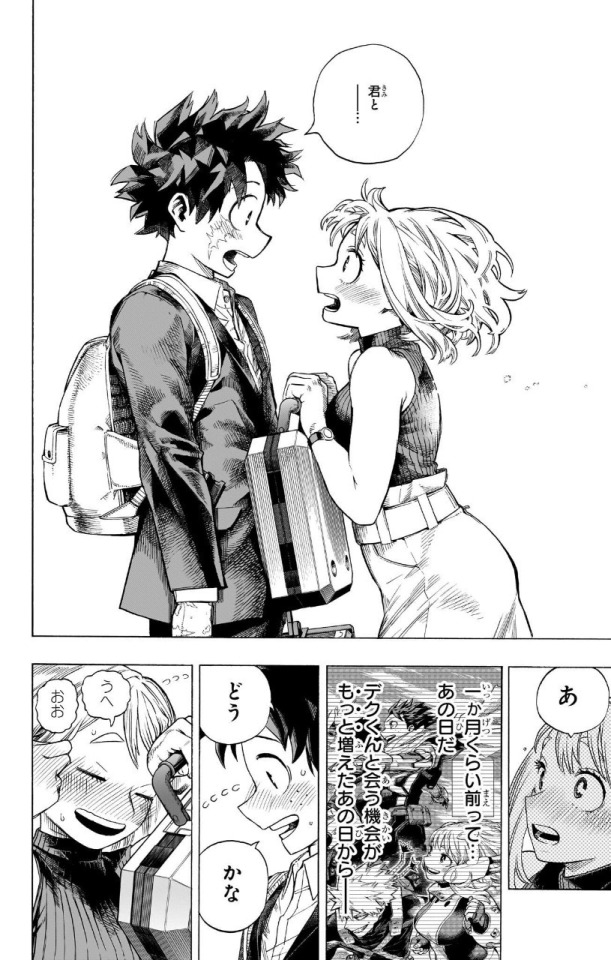
1 君とーー… きみとーー… kimi to--... "with you--..."
2 あ a "Ah--"
3 一か月くらい前って…あの日だ いっかげつくらいまえって…あのひだ ikkagetsu kurai mae tte...ano hi da About a month ago...it was that day.
4 デクくんと会う機会がもっと増えたあの日からーー デクくんとあうきかいがもっとふえたあのひからーー DEKU-kun to au kikai ga motto fueta ano hi kara-- Since that day when I had more opportunities to meet with Deku-kun--
5 どう dou "How"
6 かな ka na "about it?"
7 うへ uhe "Hehe,"
8 おお oo "ohh."
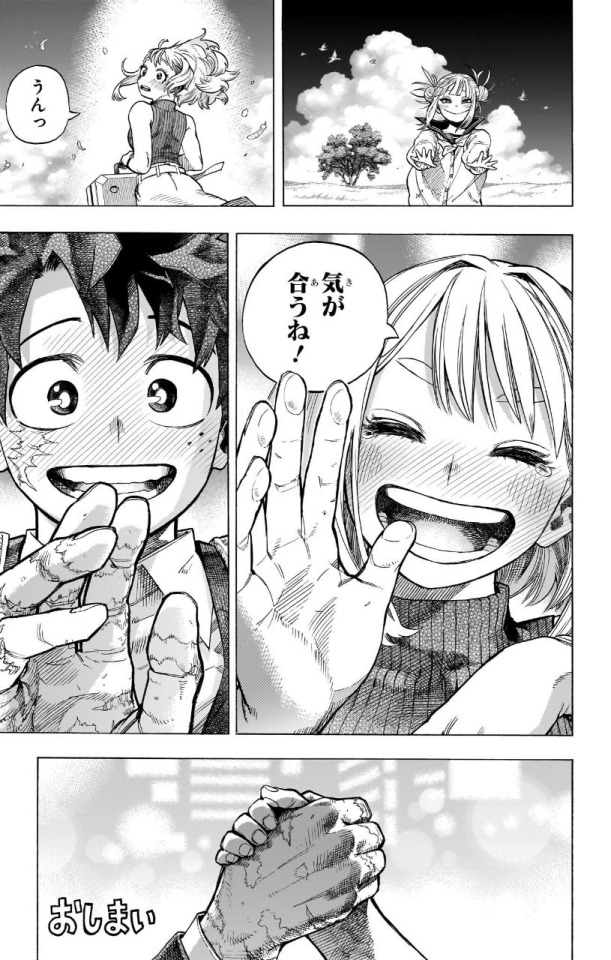
1 うんっ un "Yeah."
2 気が合うね! きがあうね! ki ga au ne! "We're of the same mind!" (Note: You can also read this as "We get along!")
tagline おしまい oshimai End
#my hero academia leak translations#mha 431#bnha 431#my hero academia manga spoilers#epilogue arc spoilers
201 notes
·
View notes
Text

主バジ / willbas 多分初めて描いた推しカプ。推しに対する解像度低めだけど推しカプ描きたいぞ〜という気持ちで描いた記憶。 以下日記です〜
前の投稿で色々描くぞ〜と言ってたんですが、梅雨と夏のダブルパンチのせいか笑っちゃうくらい些細な事でびっくりするくらい気持ちが落ちてしまって、今絵が描けそうにないのでちょっとおやすみします。 私は一回筆を折ると年単位で描かなくなり、今そうなるとこの先一生絵を描かなくなるかも…という不安でいっぱいになってしまったため、ちょっと休みつつ絵を描こうと思います。9月新刊出せなさそうだったらシールと既刊を持っていきます。5月に2冊も出した私偉いな。 (公言しないと無茶して描いて完全に筆を折りそうだったので、こんなこと書いちゃってすみません🙇) しばらくTumblrでは過去絵をちょっとずつ出そうかな。 (良い言い方が見つからなくて、気分を害されたら申し訳ないのですが)最近推しカプ作品投稿されている方が増えていて、本当に嬉しいです〜〜〜!!!!!!!!嬉しい!!!!今ゲーム3周目で丁度バジ加入直前くらいなんですが、セリフのひとつひとつにギュッとしつつ本当私は主バジが好きだなって思ってます。何度見ても体格差が良い。好きです。 あと私は本当にジュナさんがかっこよくて大好きです。最強良い女。フィデジュナもいっぱい描きたい漫画があるので、ちょっとずつ描きたい。 7月はオケコン行くので、溶けないように頑張ります。東京すでに暑すぎる🫠
68 notes
·
View notes
Text
2025/05/28 29
大きなショッピングモールで友達と待ち合わせて遅めの夕食を食べ、閉店時間までフリースペースでお茶を飲みながらおしゃべりをした
こんな風にふらりと待ち合わせて食事をしてなんとなくだらだらと話をし、またねと手を振り合うのって良いな








次の日は辺りをうろうろと歩く
普通に道路の途中にいきなり灯籠や鳥居が出てきてその下を車も通ってる
灯籠や鳥居のすぐ横に民家もあるし日常の風景になっていて不思議な感じ
お賽銭を入れてお参りする場所もなんだろう、昔は舞でもしたのかな、とか思ったり
奥にある神様が祀られている所まで行くと猫が慌てたように逃げて行き、驚かせてしまったようで申し訳ないことをした
スモークツリーが植っているのを初めて見た気がする、もふもふの花?も可愛いが葉のグラデーションも可愛い、こういうのを見ると我が家にも植えたくなる衝動
ネットでスモークツリー、鉢植えとか苗とか検索してしまったり
夜にはぽつぽつと雨が落ちてきて今朝もまだ降っている
落ち着かない体と心のまま5月を終えそう
#diary#日記#日常#日常写真#photograph#雑記#photography#雑感#思うこと#photooftheday#日記のようなもの#風景#japanease#japan#landscape#写真日記#daily photo
80 notes
·
View notes
Text







礒部 花凜は、日本の女優、声優、歌手。奈良県出身。アミューズ所属。 ウィキペディア
生まれ: 1994年5月26日 (年齢 30歳), 奈良県
学歴: 大阪芸術大学
身長: 157 cm
事務所: アミューズ
共同作業者: BlooDye; ヒーラーガールズ学生時代、友人の母が行けなくなった舞台のチケットをもらい、それを見て衝撃を受けて歌を勉強するようになった。
大阪芸術大学舞台芸術学科ミュージカルコース卒業。
2012年、「第94回全国高等学校野球選手権大会」奈良県予選決勝においてレポーターを務める。
2014年、「ミス・ユニバース・ジャパン」奈良代表で選出。
2015年2月1日から2016年1月31日まで朝日放送(現:朝日放送テレビ)制作・テレビ朝日系列で放送されたテレビアニメ��Go!プリンセスプリキュア』のオープニング主題歌「Miracle Go!プリンセスプリキュア」のボーカルを担当。大学在学中の歌手デビューとなる。
2015年12月24日より所属事務所をEFFECTからoffice EN-JINに移籍。2018年11月30日付けでoffice EN-JINを退所することが発表され、フリーの期間を経て、2019年3月1日付けでアミューズに所属。
2019年6月より、ヴォーカル&パフォーマンスユニット「BlooDye(ブラッディー)」に参加。リーダーの高槻かなこと共にヴォーカルを担当。
2021年1月より、熊田茜音・堀内まり菜・吉武千颯と共にコーラスユニット「ヒーラーガールズ」を結成。
2022年3月18日、BlooDyeを卒業。
特技は声楽、ジャズダンス、日本舞踊、バレエ、ピアノ。
お笑い芸人の松浦景子は、大学の同級生。
インテリアのコーディネートに興味を持っている。
前田佳織里からは紅茶好き、食器が集めが趣味などの理由で「アミューズの貴族」と異名をつけられている。
155 notes
·
View notes
Text
みんな知らない「実は略語」の言葉をまとめました。詳しくは...
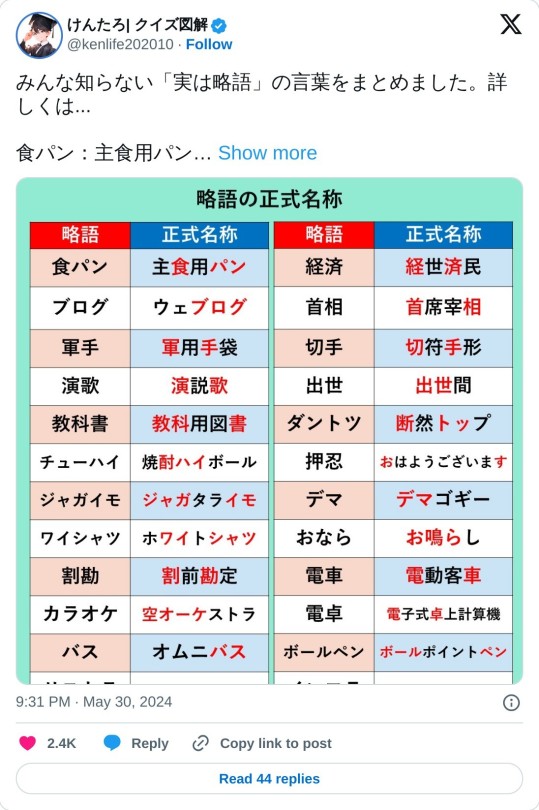
食パン:主食用パン
食パンの語源に関しては複数ありどれが正しいかわかりませんが、有力な説を2つ紹介します。1つは、「主食用パン」の略。パンが日本に入って来た当時はイースト菌などもなく、比較的小さな菓子パンだけが作られていました。それからパンが大きく膨らむようにな���、米の代わりになり得るようになったため、「主食用」と名付けられました。もう1つは、消しパンではない「食べられるパン」の略。昔は美術のデッサンなどでパンを消しゴム代わりに使用していたためです。
ブログ:ウェブログ
ウェブサイトの一種で日記形式のもの。英単語でも”blog”がありますが、もともとは”Web”と記録を意味する”log”が合わさった言葉である”web log”の略です。
軍手:軍用手袋
元々軍隊用の手袋として使われていたためです。日露戦争の際に、寒冷地を戦場とする兵士に支給するために考案されたものです。その後、荷物運搬や土いじりなど日常生活で使われるようになりました。
演歌:演説歌
元々は自由民権運動の政治運動家(壮士)たちが演説の代わりに歌った壮士節が始まりとされます。1930年代にジャズやクラシックが大衆歌に組み込まれていき、歌詞も政治とは関係のない叙情詩的なものに変わっていきました。
教科書:教科用図書
主に小・中・高および特別支援学校などで学ぶ時に配布される中心的な教材のことで、「教科用図書」の略です。教科書と教材の違いは、文部科学大臣の検定に合格したものが教科書と呼ばれます。
チューハイ:焼酎ハイボール
焼酎とハイボールを組み合わせた「焼酎ハイボール」の略語。焼酎やウォッカなど無色で香りのない酒類をベースに、炭酸で割ったものを一般的に指しますが、炭酸ではなくウーロン茶で割ったウーロンハイもチューハイの一種です。
ジャガイモ:ジャガタライモ
ジャガイモはそもそも南米原産の食材であり、日本には16世紀末にインドネシアのジャカルタからオランダ人により伝えられました。そのため当時は「ジャガタライモ」と呼ばれていましたが、後に略されていきました。ちなみに日本では中国語由来の馬鈴薯とも呼ばれます。
ワイシャツ:ホワイトシャツ
主に男性が背広の下に着るシャツのことですが、元々は和製英語である「ホワイトシャツ」の略。よく「Yシャツ」と記載されることがありますが、これは完全に当て字です。一方で、「Tシャツ」はアルファベットのTの字に似ているためこう呼ばれるようになりました。
割勘:割前勘定
友人との飲み会などでよくある割勘は「割前勘定」の略。割前とは分割してそれぞれに割り当てることを意味する言葉です。江戸時代後期の戯作者で浮世絵師として有名な山東京伝が発案されたと言われて���り、当時は「京伝勘定」と言われていたそうです。ちなみに世界的に見ると割勘の文化は少数派で、男性や年上が払うのが一般的のようです。
カラオケ:空オーケストラ
歌のないオーケストラの意味で、「空(から)オーケストラ」から「カラオケ」と略されました。カラオケは日本で1960年後半に誕生したとされ、その後世界に広がっていきました。そのため英語でも”karaoke”と書きます。ちなみに中国語では「卡拉OK」と突然アルファベットが出てくる不思議です。
バス:オムニバス
ラテン語で「すべての人のために」という意味の「オムニバス」が語源で、フランスの乗合馬車の発着所の雑貨屋の看板に書かれていたことに由来します。そこから多くの人が利用する乗合自動車をオムニバスと呼ぶようになり、その後略されました。
リストラ:リストラクチャリング
英語で「再建」を意味する”restructuring”から略されたものです。リストラと聞くと人員削減をイメージしますが、本来の意味は事業構造を再構築することです。その中の一環として、人員削減が起こります。
リモコン:リモートコントロール
英語で「遠隔操作」を意味する”remote control”から略されたものです。TVなどに向かってリモコンから赤外線をデジタル信号で送ることでチャンネルや音量などを操作することができます。
ソフトクリーム:ソフト・サーブ・アイスクリーム
海外では「柔らかいクリーム?」となり伝わらない和製英語です。英語では” soft serve icecream”であり、ソフトクリームサーバーの製造などを行っている日世の創業者・田中穰治が日本でソフトクリームを広めるのにわかりやすくするために省略したとされています。
ペペロンチーノ:アーリオ・オーリオ・ペペロンチーノ
唐辛子をオリーブ油で炒めたパスタ料理。正式名称は「アーリオ・オーリオ・ペペロンチーノ」と言います。イタリア語で「アーリオ」は「ニンニク」、「オーリオ」は「オリーブオイル」、「ペペロンチーノ」は「唐辛子」を意味しています。
経済:経世済民
中国の晋朝について書かれた歴史書である『晋書』に書かれた「経世済民」を略した言葉です。現在の政治と同じような意味で昔から使われていました。明治以降、”economy”の訳語として頻繁に使われるようになったようです。
首相:首席宰相
首席はトップを意味し、宰相は辞書で調べると「古く中国で、天子を補佐して大政を総理する官。総理大臣。首相。」と載っています。首相の言葉の中に首相が含まれている二重表現のような言葉です。ただ「首相」は日本国憲法に記載された言葉ではなく、報道などで使われる内閣総理大臣の通称です。
切手:切符手形
お金を払って得た権��の証明となる紙片のことを古くから「切手」と呼んでいました。日本の近代郵便制度の創始者である前島密が、“郵便物に貼って支払済を表す印紙”に「切手」という言葉をそのまま当てたそうです。
出世:出世間
元々は仏教語で、仏陀が衆生を救うためにこの世に出現することを指す言葉で、「出+世間」でした。そこから略され、日本では僧侶が高い位に上ることを意味するようになり、世間一般でも役職が上がることなどを指す言葉となりました。
断トツ:断然トップ
2位以下を大きく引き離すことを指す言葉ですが、元は「ずば抜けて」の意味を持つ「断然」と首位を表す英語の”top”が合わさった言葉の略。そのため「断トツの1位」という表現は二重表現になります。
押忍:おはようございます
朝の挨拶である「おはようございます」から「おっす」と短くなり、さらに「おす」へと略されました。そこから「自我を押さえて我慢する」という意味を込めて「押忍」という漢字が当てられました。
デマ:デマゴギー
大衆を扇動するための政治的な宣伝を意味するドイツ語の「デマゴギー」を略したものです。元の意味の通り、政治的な意味合いを持つ言葉でしたが、昭和になってから、単純に「嘘」や「根拠のない噂」の意味で使われるようになりました。
おなら:お鳴らし
屁を「鳴らす」の名詞である「鳴らし」に「お」をつけて婉曲に表現した言葉で、そこから一文字略されました。元々の言い方の方が上品な感じがあって良いですよね。というのも、一般庶民は昔から「屁」と言っていましたが、宮中に仕える女房たちは隠語として用いていたためです。
電車:電動客車
電動客車をより細かく表現すると、「電動機付き客車」または「電動機付き貨車」となります。電車は架線あるいは軌道から得る電気を動力源として走行しています。
電卓:電子式卓上計算機
計算機という本来役割を表す意味の言葉が略されています。1963年に世界初の電卓が登場し、1964年に現在のシャープから日本初の電卓が発売されました。当時の価格は53万5千円と車を買えるほどの値段でした。今では100均で売られているものもあるのに驚きですね。
ボールペン:ボールポイントペン
英語で”ball-point pen”と言い、これを略した言葉です。ボールという単語が使われている理由は、ボールペンの構造上、先端に小さな回転玉(ボール)があるためです。
インフラ:インフラストラクチャー
英語で「下部構造」や「基盤」を意味する”infrastructure”から略されたものです。電気・ガス・水道・電話・道路・線路・学校や病院などの公共施設など、私たちの生活に欠かせ��いものを指す言葉となっています。
シネコン:シネマコンプレックス
「コンプレックス”complex”」が「複合の」を表す英単語で、同一ビル内に複数のスクリーンを備えた複合型映画館のことを表します。国内の代表的なものとしては、TOHOシネマズ、イオンエンターテイメント、MOVIX、ユナイテッド・シネマなどがあります。
シャーペン:エバー・レディー・シャープペンシル
シャーペンが「シャープペンシル」の略ということを知っている方は多いと思いますが、実はこれも略語。1838年にアメリカで「エバーシャープ」という筆記具が登場し、その後1915年に現シャープの創設者である早川徳次氏が国内初となるものを考案し、「エバー・レディー・シャープペンシル」という商品名をつけヒットさせました。
ピアノ:クラヴィチェンバロ・コル・ピアノ・エ・フォルテ
イタリア語で「小さい音と大きい音を出せるチェンバロ」という意味です。いつの間にか「小さい音」を表すピアノだけに略され、楽器を表す名詞となりました。元のピアノの意味は今でも音の強弱を表す「メッゾピアノ」や「ピアニッシモ」と合わせて音楽記号として使われていますね。
361 notes
·
View notes
Text
24/05/2025

沖永良部産じゃがいも ゴールド🥔 ちょいCafeにて販売中でした♡ ハートのじゃがいもを持っているのは私ではなく、ちょいCafeオーナーです🤗


本日の日替わりlunchは鶏の唐揚げでした🐔




パイナップルケーキ🍍 久しぶりの生チョコ抹茶タルトでした🍵




今日もオーナーたちといっぱい喋って元気を頂きました💪
この後はお約束の徳丸屋さん♡


大雨という天気もあり、ケーキが残っていました🤗


抹茶プリン🍵とプスタチオプリン🍮
ケーキではなくプリンに走りました。


#備忘録#photography#japan#reminder#kyushu#kagoshima#美味しさは正義です#スイーツには夢がないとダメ#sweets#satsumasendai#一休・ちょいCafe#standcafe_choicafe#スタンドカフェ~ちょいカフェ#kedoin#satsuma#tokumaruya#徳丸屋
56 notes
·
View notes
Text
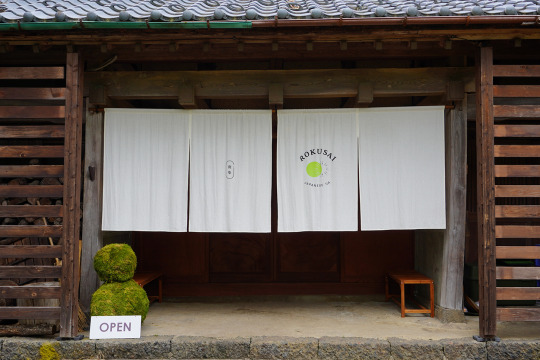
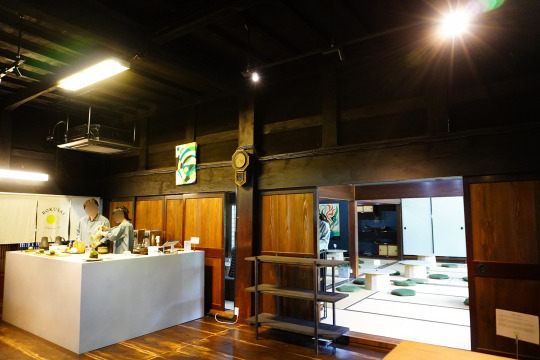
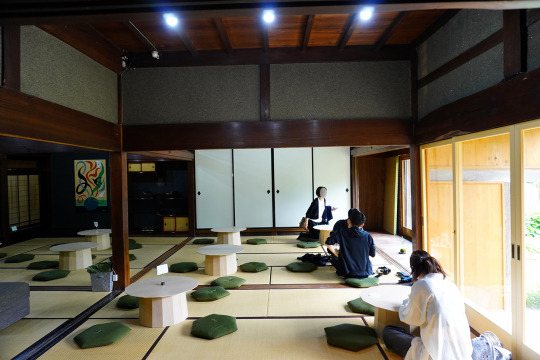

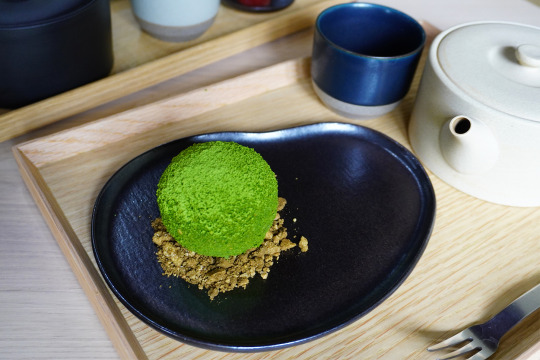
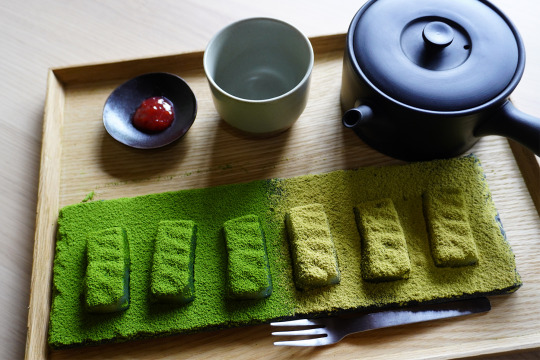
2025.05.31(土)
先日33年に一度の御開帳があった平泉寺近くの古民家カフェ「ROKUSAI(鹿柴)」へ買い物ついでにこちらまで足を延ばしてティタイム。
お店の名前は唐の詩人、王維(おうい)が詠んだ「鹿柴」の詩に由来しているとのこと。
空山不見人 空山(くうざん)人を見ず
但聞人語響 但(た)だ人語の響を聞く
返景入深林 返景(へんけい)深林に入り
復照青苔上 復(ま)た照らす 青苔(せいたい)の上
苔玉チーズケーキ(中身はレアチーズケーキとベイクドチーズケーキの2層構造)
苔梅わらび餅(福井梅を忍ばせたわらび餅は境内が苔で覆われている「平泉寺」の石畳をイメージ、コーティングは「一番茶抹茶」と「抹茶きな粉」を使用)
飲み物は二人とも和紅茶(Japanese Black Tea)
ちょっとだけ贅沢で、ゆっくりとした時間を過ごせた、小雨が合う一日。
49 notes
·
View notes
Text
New Room Trouble Lines: [Ace]:
[Disclaimer]: may not be in the right order
Ace: そこまで怒ることなくね!? Riddle: 生意気な口をおききだね!
Ace: お前みたいなバカとセット扱いとかホント無理! Deuce: お前みたいにテキトーな奴なんかとつるむかよ!
Ace: マジカメブロックしよ Cater: 優しく言ってるうちに反省しな?
Ace: はい、わっかりました~ Trey: 甘やかしすぎたか?
Ace: 暴力ハンターイ! Leona: あまり調子に乗ると…わかってるな?
Ace: 脳筋は黙っててくださーい Jack: 口だけは達者な野郎だ!
Ace: オレのパン盗ったでしょ!? Ruggie: 身に覚えないッスね~!
Azul: あちらでたーっぷりお話しましょう Ace: やだな~冗談っすよ~?
Jade: そのお話もっと詳しく Ace: 面倒な人に目ェつけられた…
Floyd: 生意気~ 絞めちゃおっと Ace: 違う違う!逆らってません!
Kalim: 細かいことは気にすんなって! Ace: この人話通じてねーわ!
Ace: 意地悪な先輩ってヤだな~ Jamil: 図々しい後輩は可愛くないな
Ace: ネクタイ緩めてただけなのに… Vil: みっともない小ジャガね
Epel: コテンパンにしてやる! Ace: 拳で語り合うとか、ダサくね?
Rook: 心ゆくまで語り合おう! Ace: このテンションついてけねー!
Ace: よく聞こえないんすけど~ Idia: 陽キャ、圧がツヨ…
Ace: お前言う事キツすぎ! Ortho: つい本当のこと言っちゃった
Ace: オレ…終わったかと思った… Malleus: 少し睨んだだけだ
Ace: んな小っ恥ずかしいこと、よく真顔で… Silver: お前のためになるかと思ったんだが
Ace: 声デカ男、うぜー Sebek: 同学年とは思えん幼稚さだ!
Ace: こっちはビビったんですけど! Lilia: お茶目なジョークじゃろう
Ace: うっせー、タヌキ! Grim: うるせー、バクハツ頭!
#twst assets#character dialogue#this is taking a lot of effort so its entirely possible i''ve made some human error#sorry#ace trappola
67 notes
·
View notes
Text
〜なら = assuming that ~ is already true

some months ago, i posted an explanation of the difference between 〜たら and 〜なら that i (and other people!) weren't quite satisfied with, especially on the なら end of things. so i decided to take another, more thorough stab at it! let's see if i can do a better job explaining it this time!! 早速ですが、頑張って説明させていただきます!!
how is なら usually translated?
usually, people translate なら as "if", no questions asked. however, when i was in school for linguistics, i learned a very different (and really particular) definition of なら, which we called "assertive" なら: "if, as you say..."
what the hell does that mean, i hear you mutter amongst yourselves—and to be clear, that was my exact reaction, too (lol). in my opinion, "if, as you say" is not a clear or helpful definition of なら, nor is "assertive" a very helpful moniker....we whiffed this one, linguists! so, let me try and do better!
for now, let's translate 〜なら as "assuming ~ is already true". this is clunky and probably not where we'll ultimately end up in our translation, but hopefully you agree with me that, even with no other information, it's better than "if, as you say"!
why have i put forward this particular definition? well, let's wait and see ;)
what can なら attach to?
the short answer: anything.
the long answer: check out this cool bullet list i made!
N + (の)なら
V[plain] + (の)なら
い-ADJ + (の)なら
な-ADJ + (の)なら
~FAQ~
Q: wow! that's easy! A: i know, right? for once in our lives (lol) Q: what exactly does [plain] mean? A: it means ANY plain form (nonpast, past, negative, whatever) Q: speaking of tense, what about tense? A: なら can attach to any tense! for verbs and い-adjectives, that means 〜たなら, and for nouns and な-adjectives, that means だったなら. Q: what's with the (の) everywhere? A: that's optional and it comes up a lot in japanese when you're expressing your opinion, offering advice, or giving explanations (often as ん in speech). if you're not familiar with it, it's not vital to understanding this lesson, so don't worry!
let's explain なら!
at last, it's time! remember our preliminary definition? let's say 〜なら means "assuming ~ is already true".
under this definition, なら functions as a marker of assumptions: in essence, なら marks a clause that the speaker is taking for granted (i.e., as true). by using なら, we set a stipulation for the following clause.
let's see some examples!
空港に行くなら、一緒に連れて行ってください。 = assuming you are in fact going [= if you are going] to the airport, please take me with you.
how do you like that translation in orange? clunky, right? but, on the other hand, it makes it very obvious what なら is actually doing in this sentence—namely, setting a stipulation! let's look at a bit more closely, in english:
the stipulation: you are going to the airport the follow-up: please take me with you the implication: if you're not actually going, then you can't take me with you
presented like this, it becomes clear that if we were to modify or reject the stipulation, the follow-up would go out the window. in context, for example, what if the listener interrupts and says, "oh, sorry, i scrapped that plan, i'm not actually going to the airport"? then, of course, "please take me with you" would no longer be relevant. if the なら clause stops being true, so does its follow-up clause. whether or not the follow-up comes true is entirely reliant on the なら clause coming true first. i mean, that's just how stipulations work, right!
let's see another example:
カフェインは苦手だけど、お茶なら飲める。 = i don't handle caffeine well, but assuming the drink is tea [= if it's tea], then i can drink it.
here the なら stipulation is highlighted in orange again. let's dig in:
the stipulation: the caffeinated drink is tea the follow-up: i can drink it the implication: i won't drink anything caffeinated that's not tea (e.g., coffee)
see how the follow-up relies on the stipulation? this is a pretty easy case to imagine, since lots of people have stipulations about their diets (i drink tea but not coffee, i eat fish but not meat, i like jalapeño but not wasabi...you get the idea lol). in context, the listener might say, "how about coffee?" and the speaker would reply, "nope, no can do", which shows how the follow-up (飲める) can only come true if the stipulation (お茶なら) is already true.
let's see a MISUSAGE of なら, to compare with what we've seen so far:
❌ 私が行くつもりなら、彼も行く。 = assuming i intend [= if i intend] to go, he will also go. ❌
can you already see where this sentence is going wrong? hint: it's in 私!
so, we know なら points to a stipulation, and usually, you don't have to stipulate about something you yourself control. therefore, in a clause like 私が行くつもりだ, where you have complete control over whether or not that clause is true, there is no real world in which なら makes grammatical sense. otherwise, it makes it sound like you don't control your own つもり! (similarly, it's not grammatical to say, 私がVたいなら). basically: if the speaker controls whether the clause comes true, using なら in that clause isn't grammatical.
summary!
so, what do you guys think? is this a helpful way of describing なら? let's summarize quickly:
〜なら can be translated as "assuming ~ is already true". (clunky, but effective!)
in a なら sentence, the なら clause must be a stipulation. (if the speaker can control whether or not it comes true, it's not a stipulation!)
in a なら sentence, the follow-up clause can come true if and only if the なら clause has already come true.
phew....we did it! as always, these points are just the way it makes sense to me to explain it, so if you don't get it, just keep noticing when なら appears out in the wild and it'll get clearer and clearer! plus, there are exceptions to every rule :)
so...how is this different from 〜たら and 〜と and 〜ば?
great question, the answer to which could fill a book, actually probably several....i won't offer my explanations in this post because it would become longer than my master's thesis, but if you feel confident in reading native japanese, i highly recommend you look up explanations of all four conditionals written in japanese. here's one i like a lot:
not all explanations are there are as linguistic as this one, there are also pages more geared toward learners, so if you do a quick search you should be able to find something. and, of course, if you REALLY want my two cents, send me an ask!! i'm happy to give my explanation, just elsewhere :)
anyway, thanks for reading as always! お疲れ様でした!! 🙇🏻♀️

56 notes
·
View notes
Text
Differences in localization and the original pt. 1
I am starting a series of posts with the goal of familiarizing players with some of the differences that localization creates for us in contrast to the original.
Some moments are radically different, misleading and causing controversy, while some do not change the essence of what is happening, but are still noticeably different
Disclaimer: these posts will be written solely for the purpose of familiarization; I do not force anyone to play the game in Japanese, because you are free to choose the version of the game that is comfortable for you. I just noticed some moments and want to share them with you.
The localization of Gyakuten Saiban (Ace Attorney) is essentially good, but there are some moments, IMHO, that I personally would not adapt or change in any way
One of the most serious changes, which, in my opinion, should not have been touched at all, is Mitsurugi's (Edgeworth) phobias.
As if case 1-4 never happened.
In the Japanese version, when examining the files in Mitsurugi's office, Naruhodō will be perplexed about the need for such high shelves - they could collapse during an earthquake.
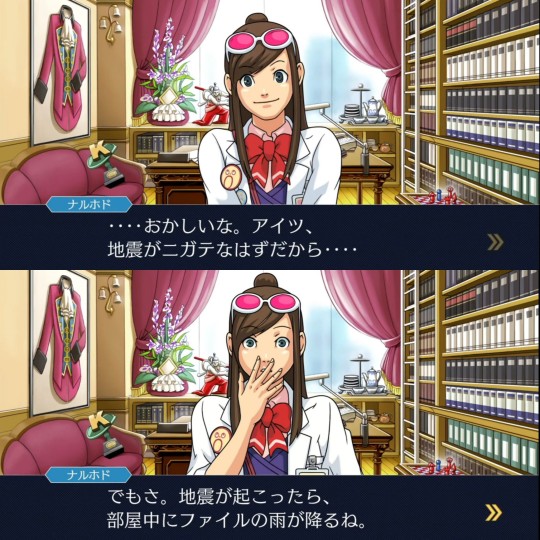
・・・・おかしいな。アイツ、 地震がニガテなはずだから……
Okashī na. Aitsu, jishin ga nigatena hazudakara……
...That's strange. He's supposed to be bad with earthquakes...
でもさ。地震が起こったら、 部屋中にファイルの雨が降るね。
demo sa. Jishin ga okottara, heya-chū ni fairu no amegafuru ne.
But if an earthquake happens, files will rain down all over the room.
In the localization (for some reason) at this point Mitsurugi was given a fear of heights. For what reason... I don't understand
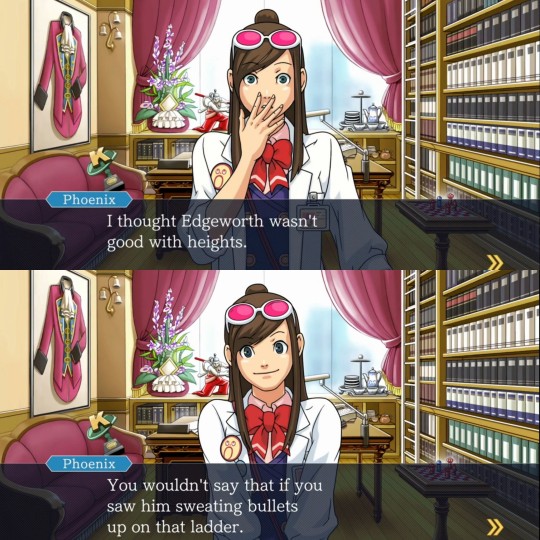
___________________________________________
Next, another big difference is Naruhodo's food preferences
In the Japanese version, Tomi the clown offers him miso ramen (which is cooked in chicken broth and miso), which Naruhodo refuses and says that he prefers tonkotsu ramen (cooked in pork broth and boiled pork is added to it).
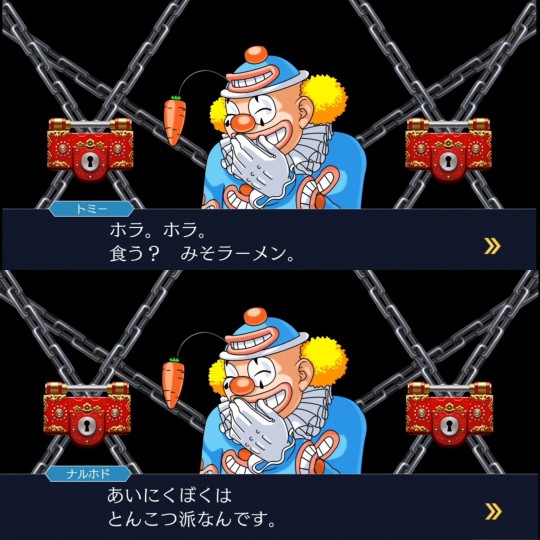
ホラ。ホラ。 食う? みそラーメン。
hora. hora. Kuu? Miso rāmen.
Look. Look. Want some miso ramen?
あいにくぼくは とんこつ派なんです。
ainiku boku wa tonkotsu-hana ndesu.
Unfortunately, I prefer tonkotsu (ramen).
That is, Naruhodo literally says that he would prefer pork, not chicken.
What about the localization? It's the other way around.
The clown offers him a burger (the patties for which are usually made from beef and pork), but he says that he would rather choose a chicken sandwich.
Why?
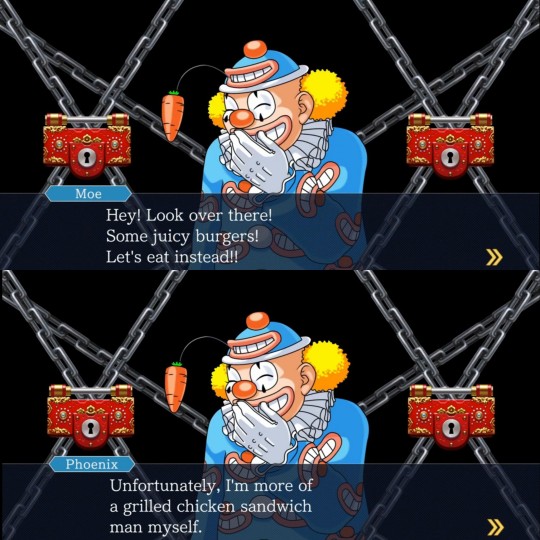
___________________________________________
Vending machine in 1-3
I have no complaints about its contents (it is adapted), but here another preference of Naruhodo is lost
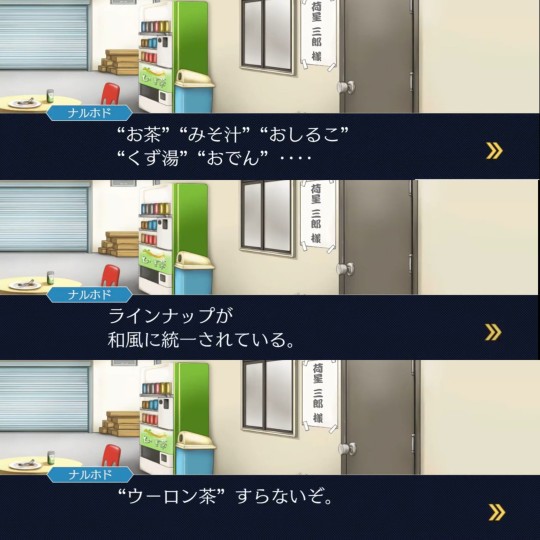
“お茶”“みそ汁”“おしるこ” “くず湯”“おでん”・・・・
“ocha” “misoshiru” “o shiruko” “kuzu yu” “oden”
"Tea" "Miso soup" "Oshiruko" "Kudzu soup" "Oden" ...
ラインナップが 和風に統一されている。
rain'nappu ga wafū ni tōitsu sa rete iru.
The lineup is unified in Japanese style.
“ウーロン茶”すらないぞ。
“ūron cha” sura nai zo.
There's not even "oolong tea."
In the Japanese version, reading the menu of the vending machine, Naruhodo annoyedly comments that "there is not even oolong tea". He literally names the tea he likes!
In the localization, he is disappointed that the food in the vending machine is too... ordinary, and he was expecting something that is not usually sold there (popcorn).
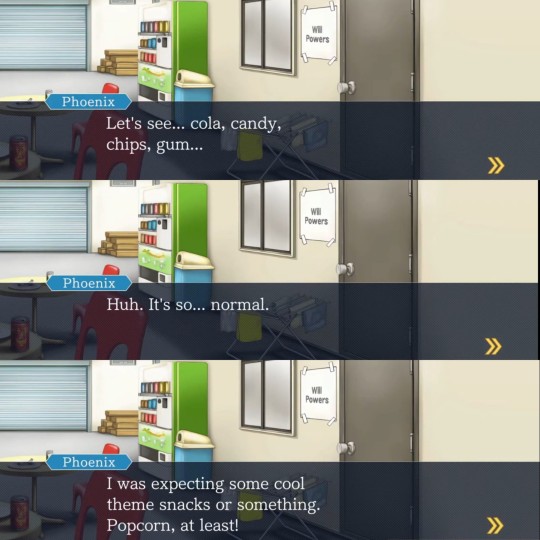
___________________________________________
Naruhodō University
Case 3-1 is very rich in information about the young Naruhodō, including the name of the university he attended
In the Japanese version, it is Yumei University (the same university where his ancestor Ryunosuke Naruhodō studied during the Meiji era - then it was called Yumei Imperial University), which creates an important reference to Dai Gyakuten Saiban (The Great Ace Attorney)
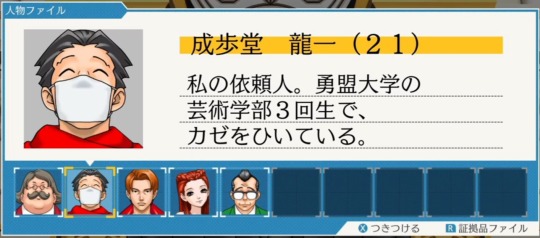
私の依頼人。勇盟大学の 芸術学部3回生で、 カゼをひいている。
watashi no iraijin. Yūmei daigaku no geijutsu gakubu 3-kaisei de, kaze o hīte iru.
My client. A third-year student in the art department at Yumei University, suffering from a cold.
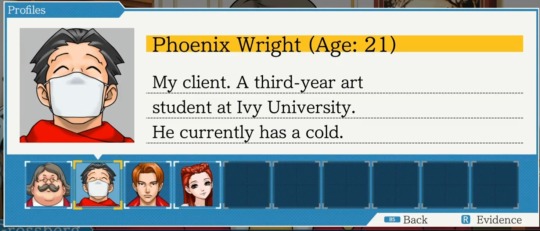
In the localization, he studies at Ivy University, as if referring to the famous Ivy League (elite universities).
A very good decision that shows Naruhodō's abilities and the high quality of his education (my clever boy)
___________________________________________
Interesting addition
And the last one for today, a conversation with Mask in the detention center
When Yusaku (Ron) tells the story of the allegedly lost vase, Naruhodō makes a comment about the absurdity of his story
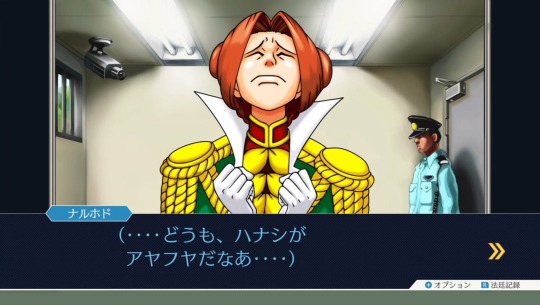
(・・・・どうも、ハナシが アヤフヤだなあ・・・)(dōmo, hanashi ga ayafuya da nā)
(... I guess the story is a bit vague...)
The localization decided to make a reference to Naruhodō's education in the field of art, and he compares Mask's story to the surreal paintings of Dali.
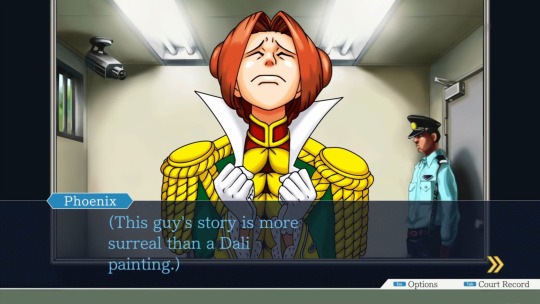
A nice addition, but still different from the original version.
___________________________________________
In total, in my opinion, 3 unsuccessful changes out of 5.
If you also noticed any differences - feel free to tell us about them. Let's educate ourselves together.
It will be a bit more difficult with the subsequent parts, because I can't buy the Japanese version of TGAA (it is only available to a certain list of countries), and I don't have the new Apollo trilogy and the Investigations duology to check every little thing (and I don't have an extra $80), and those who record the walkthrough do not always check every clue, where the contradictions lie.
175 notes
·
View notes